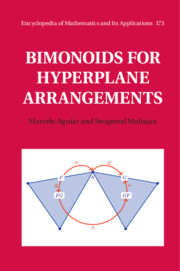Book contents
- Frontmatter
- Contents
- Preface
- Introduction
- Part I Species and operads
- Chapter 1 Hyperplane arrangements
- Chapter 2 Species and bimonoids
- Chapter 3 Bimonads on species
- Chapter 4 Operads
- Part II Basic theory of bimonoids
- Part III Structure theory for bimonoids
- Appendices
- References
- List of Notations
- List of Tables
- Author Index
- Subject Index
Chapter 3 - Bimonads on species
from Part I - Species and operads
Published online by Cambridge University Press: 28 February 2020
- Frontmatter
- Contents
- Preface
- Introduction
- Part I Species and operads
- Chapter 1 Hyperplane arrangements
- Chapter 2 Species and bimonoids
- Chapter 3 Bimonads on species
- Chapter 4 Operads
- Part II Basic theory of bimonoids
- Part III Structure theory for bimonoids
- Appendices
- References
- List of Notations
- List of Tables
- Author Index
- Subject Index
Summary
This chapter provides a categorical framework for the notions of monoids, comonoids, bimonoids in species (relative to a fixed hyperplane arrangement). The usual categorical setting for monoids is a monoidal category. However, that is not the case here; the relevant concept is that of monads and algebras over monads. We construct a monad on the category of species, and observe that algebras over it are the same as monoids in species. Dually, we construct a comonad whose coalgebras are the same as comonoids in species. In addition, we construct a mixed distributive law between this monad and comonad such that bialgebras over the resulting bimonad are the same as bimonoids in species. Moreover, the mixed distributive law can be deformed by a parameter q such that the resulting bialgebras are the same as q-bimonoids. The above monad, comonad, bimonad have commutative counterparts which relate to commutative monoids, cocommutative comonoids, bicommutative bimonoids in species. We briefly discuss the Mesablishvili-Wisbauer rigidity theorem. As a consequence, the category of species is equivalent to the category of 0-bimonoids, as well as to the category of bicommutative bimonoids. These ideas are developed in more detail later. We extend the notion of species from a hyperplane arrangement to the more general setting of a left regular band (LRB).
Keywords
- Type
- Chapter
- Information
- Bimonoids for Hyperplane Arrangements , pp. 134 - 167Publisher: Cambridge University PressPrint publication year: 2020



